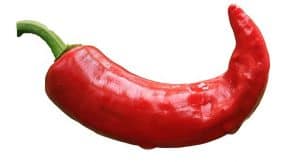Can cayenne help with weight loss?
Cayenne pepper is a herb that is commonly added to food to add that spicy heat, so many of us love to eat, and this addition may just help you lose weight. I absolutely love cayenne. I like to add it to anything from Creole cooking to buffalo wings. I have even added it to pizza sauce, which adds a little extra kick to this favorite food. If you’ve ever accidentally added a little too much of this spice to your meal, you will quickly find out the warm that is cayenne. When I was in a vitamin store the other day, I saw a bottle of cayenne capsules. The label claimed that it would help with weight loss, blood pressure, and your cholesterol. This statement begged me to research this claim further.
I already wrote an article on spicy foods and the research that shows it helps with weight loss in the post: Research Proven Weight Loss: Spicy Foods. This post will tackle the specific question about whether cayenne will help with weight loss. It would make sense that it would because cayenne, the spice, is nothing more than a red powder that comes from grinding up dried cayenne peppers. Cayenne, like other peppers, contains capsaicin. Capsaicin is the active ingredient that causes the burning feeling.
So does cayenne cause weight loss? Research says yes. Capsaicin is also found in other types of peppers. There are multiple studies that show that capsaicin increases your metabolism, assists with weight loss, and reduces appetite. The effect is real, but it is rather small.
Research on cayenne and capsaicin:
- Capsaicin increases metabolism. Your metabolic rate is basically the speed at which your body converts the calories you get from food and beverages into energy. A faster metabolism will result in more calories burned per unit of time ,so less of the energy will be excess and thus result in less energy stored as fat. One study from 2011 showed that red pepper or cayenne caused a modest 10 Calorie increase in metabolism[1]. Another study from 2010, showed that chili pepper ingestion could cause up to 50 Calories per day increase in metabolism[2]. One final study showed an increase in fatty acid oxidation or utilization with capsaicin consumption[3]. Additional studies have found similar results[4],[5],[6].
- Capsaicin reduces appetite. Results are mixed. The same 2011 study showed cayenne reduced appetite[1]. The researchers found a decrease in preoccupation with food but no change in the desire to eat. A European study showed in 2009 showed no change in hunger, but ghrelin was reduced by pepper ingestion[7]. Additional studies have also shown a reduction in appetite[2],[3].
- Capsaicin results in fewer cravings. A 2014 study that as published in the journal Appetite showed that people who consumed red pepper with every meal felt increased feelings of fullness and had fewer cravings. The study results also suggest that adding capsaicin to your diet can suppress your appetite[3]. This can lead to a decrease in caloric intake and an increase in weight loss.
The bottom line: Red pepper or cayenne may curb your appetite, speed up your metabolism, and help you burn calories. The Natural Medicine Database says there is insufficient evidence to support the use, but examine.com[4] indicates that capsaicin reduces calories eaten and increases caloric utilization. I personally feel there is enough evidence for me to increase my intake so enjoy a few cayenne peppers. If you can’t tolerate them, try cinnamon instead. More research is needed.
References
- [1]M.-J. Ludy and R. D. Mattes, “The effects of hedonically acceptable red pepper doses on thermogenesis and appetite,” Physiology & Behavior, vol. 102, no. 3–4, pp. 251–258, Mar. 2011, doi: 10.1016/j.physbeh.2010.11.018.
- [2]H. C. Reinbach, A. Smeets, T. Martinussen, P. Møller, and M. S. Westerterp-Plantenga, “Effects of capsaicin, green tea and CH-19 sweet pepper on appetite and energy intake in humans in negative and positive energy balance,” Clinical Nutrition, vol. 28, no. 3, pp. 260–265, Jun. 2009, doi: 10.1016/j.clnu.2009.01.010.
- [3]P. L. H. R. Janssens, R. Hursel, and M. S. Westerterp-Plantenga, “Capsaicin increases sensation of fullness in energy balance, and decreases desire to eat after dinner in negative energy balance☆,” Appetite, vol. 77, pp. 46–51, Jun. 2014, doi: 10.1016/j.appet.2014.02.018.
- [4]“Capsaicin – Scientific Review on Usage, Dosage, Side Effects,” Examine.com, Jan. 27, 2018. https://examine.com/supplements/capsaicin/ (accessed Jan. 27, 2018).








Be the first to comment on "Research: Cayenne and weight loss"